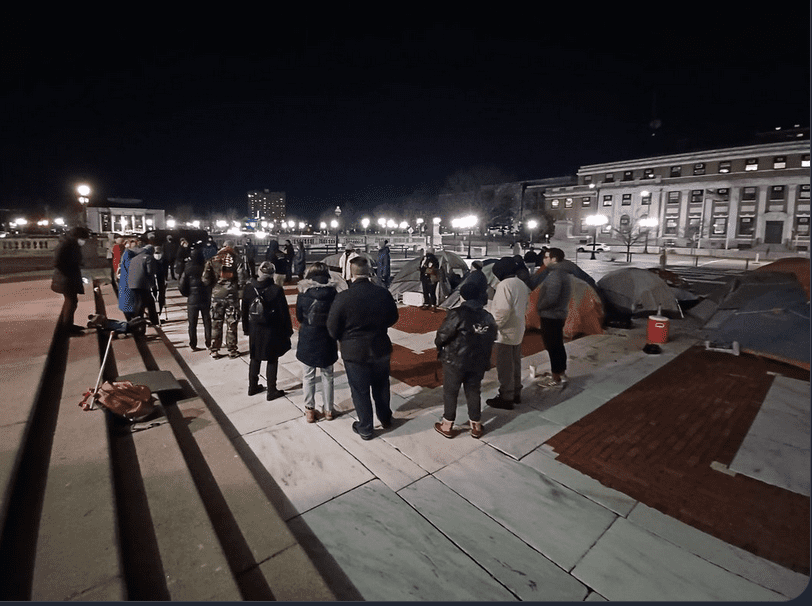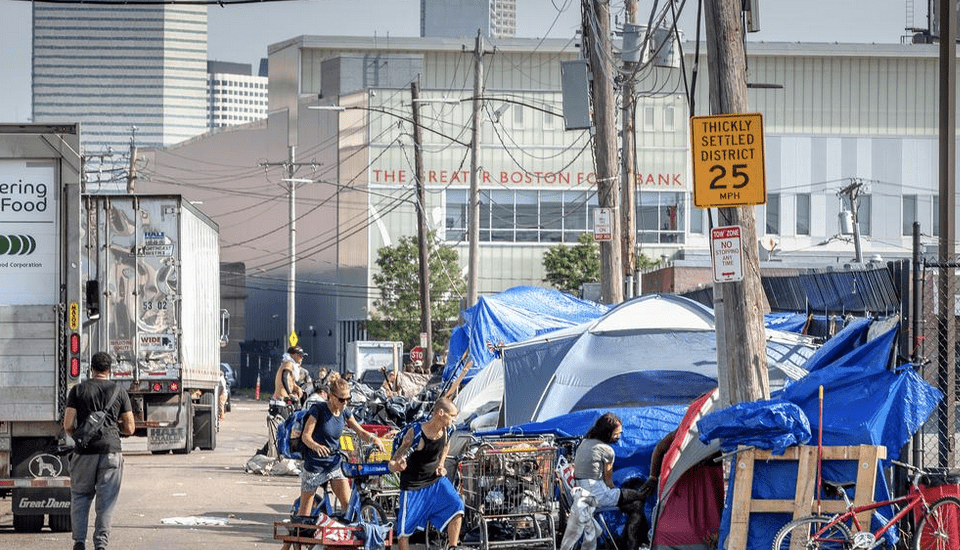Search Posts
Recent Posts
- Outdoors in RI: Help keep recreation areas clean. Invasive Milfoil, trash. 2A update – Jeff Gross July 26, 2024
- Real Estate in RI: Highest-ever sale in Queen’s Grant, EG $1.25M, by Residential Properties July 26, 2024
- Homeless in RI: Gov. Newsom issues Executive Order. Remove California’s encampments. July 26, 2024
- Let the games begin. XXXIII Summer Olympics – John Cardullo July 26, 2024
- GriefSPEAK: What would you do? – Mari Dias Nardolillo July 26, 2024
Categories
Subscribe!
Thanks for subscribing! Please check your email for further instructions.

Breaking: Boston to remove “Mass & Cass” homeless encampment. Rhode Island to announce a plan to address homelessness TODAY.
Yesterday, the new mayor of Boston, Michelle Wu, announced the plans to eliminate the homeless encampment known as Mass & Cass – today, Gov. McKee and others will announce “immediate measures to address homelessness and provide shelter for Rhode Island’s families and individuals”. For several weeks, a group has been encamped at the RI State House marble courtyard, sleeping out and calling on the state to do something so “no Rhode Islander will freeze to death this year”.
Rhode Island’s press conference will be TODAY at 10am at the RI Coalition to End Homelessness in Pawtucket. Gov. McKee will be joined by the Lt. Governor and the Commerce Secretary.
The Boston Plan
Boston sets date of January 12 to connect remaining residents with services, prevent further encampment

Mayor Michelle Wu and senior advisors announced an updated timeline and key steps to transform the area around Mass. Ave. and Melnea Cass Boulevard with a citywide plan to connect residents experiencing homelessness and substance use with needed housing and services. Following a December survey of all individuals living in tents in the area to identify housing and medical needs, the city set a deadline of January 12th to connect those unsheltered individuals with appropriate services and ensure the area remains clear of encampments following that date.
The City’s emergency response goals are to help individuals experiencing homelessness, mental health issues and substance use disorders transition from living in unsafe encampments to living indoors in a safe and supportive environment while receiving medical care; and to promote safety in the area surrounding Mass Ave and Melnea Cass Boulevard.
Dozens of low-threshold supportive housing placements are currently available or slated to come online within weeks, including at:
- The EnVision Hotel, a 41-bed low-threshold, congregate transitional housing program operated by Victory Programs serving as an intermediate step between homelessness and permanent housing;
- Shattuck Hospital Campus will host two temporary housing programs and one treatment program. The Cottage Community will provide temporary, low-threshold transitional housing and wrap-around services for up to 30 people in collaboration with the MA Executive Office of Health and Human Services and operated by Commonwealth Care Alliance and Eliot Human Services. Also at the Shattuck, Bay Cove Human Services will open 17 new beds for women to provide acute substance use treatment and connections to the next level of care. Pine Street Inn will open low-threshold shelter beds for up to 30 men with housing case management and medical care.
- Roundhouse Hotel, a temporary site administered by Boston Medical Center that can house up to 60 individuals. They will have 24/7 staff and case management, with stabilization services to support recovery and transition into permanent housing. The Roundhouse will have intensive medical offerings to help individuals address mental health and substance use needs, as well as connect to long-term and evidence-based treatment.
In addition to these sites, the City will aim to lower barriers to beds at existing city-owned shelters and explore additional low-threshold options across the city. Mayor Wu has previously announced that her administration would aim to open at least 200 low-threshold beds across the city.
These efforts, led by Senior Advisor Dr. Monica Bharel, Boston Public Health Commission Executive Director Dr. Bisola Ojikutu and Housing Chief Sheila Dillon are based on a public health, harm reduction and equity-focused approach.
The City’s goals are to connect residents with supportive housing and remove encampments from the neighborhood. Any tents that remain after January 12th will be responded to with the City’s existing encampment protocol, carried out by the Boston Public Health Commission, Boston Police Department, Inspectional Services Department, and Department of Public Works, including notice and storage of belongings. The City will maintain an ongoing presence, including outreach and street cleaning so that further encampments do not develop.
“With these actions, our goal is to bring residents out of the cold and into supportive housing, to change the status quo in this area and citywide,” said Mayor Michelle Wu. “Our team is taking every possible action to alleviate the humanitarian crisis at Mass Ave and Melnea Cass Boulevard and keep this area clear of encampments moving forward. I thank the cross-departmental team of public health, housing, public safety, and public works professionals who have rallied to put this plan into action.”
“We are working to transform the way we care for individuals experiencing homelessness with substance use disorder and mental health issues through a public health and equity lens,” said Special Advisor Dr. Monica Bharel. “This transformation will minimize the barriers to accessing housing and treatment. To that end, we have launched an emergent effort to bring online low threshold and transitional housing options where individuals will have access to appropriate treatment and a path to recovery and healing.”
“The Boston Police Department is fully committed to partnering with our city’s public health and housing agencies to assist the individuals living in the Mass and Cass area with their transition to supportive housing and to keeping this area clear of encampments moving forward,” said Acting Commissioner Gregory Long. “I thank the officers that work in the Mass and Cass area for their ongoing efforts to ensure that individuals suffering from substance use disorder and mental health challenges have access to the safe housing and services they need.”
“The situation at Mass and Cass is a public health and humanitarian crisis that encompasses chronic homelessness, mental health, and substance use disorders. That’s why we’re taking a public health-oriented approach to respond to this crisis. We are working every day to address the barriers faced by each person living in these encampments and to connect them with the medical care, substance use treatment and housing that they need,” said Dr. Bisola Ojikutu.
“The Public Works Department continues to utilize every resource at our disposal to keep the streets and sidewalks around Mass Ave. and Melnea Cass Boulevard clean and sanitary,” stated Public Works Superintendent of Streets, Mike Brohel. “As the City of Boston takes a more comprehensive approach to transform the area, we look forward to working in partnership with our fellow city agencies, community groups and business owners to deliver essential city services that assist our most vulnerable populations.”
“The City, working with many area non-profit organizations, will continue to work with individuals living on the street to secure them safe and supportive low-threshold shelter and housing,” said Sheila Dillon, Chief of Housing. “These placements will allow individuals to receive and accept the services they need to stabilize their lives and plan for the future. The City will work on strengthening the connections and coordination between treatment and housing as it continues to address this issue.”
Every day, the City works to connect people in the Mass Ave and Melnea Cass Boulevard area to housing, treatment, and other supports across the city and region. The Boston Public Health Commission (BPHC) Recovery Services offers services that encompass the continuum of care including education, overdose prevention and naloxone distribution, street outreach, day-time low-threshold spaces, drop-in access to care services for treatment, transitional and long-term residential programming, outpatient services, youth substance use prevention and a peer recovery center. The Recovery Services Street Outreach team serves an average of 300 people daily through the Engagement Center and street outreach routes in the area of Mass Ave and Melnea Cass Boulevard. Every day, they place an average of 10 people in residential treatment programs across the state and respond to around 5 overdoses. BPHC Homeless Services also oversees a variety of programs that address complex needs associated with homelessness, such as emergency shelter, health and behavioral health services, job readiness and training, substance use treatment, recovery support, and housing services
